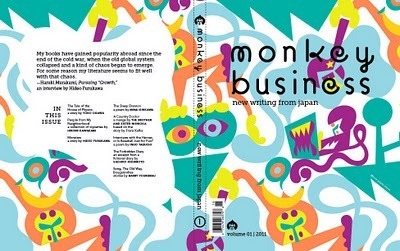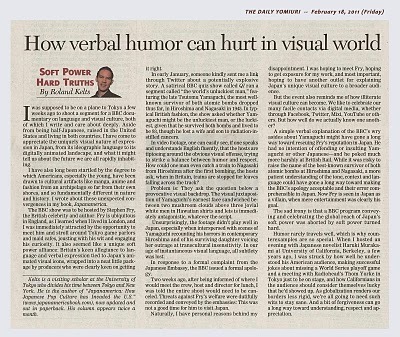Roland Kelts's Blog, page 76
March 8, 2011
Live in London, April 14
[image error]
[image error]
The Daiwa Anglo-Japanese Foundation invites you to an afternoon lecture
Pop Culture from a Multipolar Japan
Thursday, 14 April, 2011
4-5pm, followed by a drinks reception to 6pm
Daiwa Foundation Japan House
13/14 Cornwall Terrace, Outer Circle London NW1 4QP
[image error]Baker Street
Is there something more to the West's fascination with Japanese anime and manga? How are anime films and manga comics cultural channeling zones, opened by the horrors of war and disaster and animated by the desire to assemble a world of new looks, feelings and identities? Professor at the University of Tokyo, Sophia University and the University of the Sacred Heart Tokyo, Roland Kelts addresses the movement of Japanese culture into the West as sign and symptom of broader reanimations. With uncertainty now the norm, style, he argues, is trumping identity, explaining, in part, the success of Japanese pop and fashion, design and cuisine in the West.
[image error]
Contributors:
Roland Kelts is a half-Japanese American writer, editor and lecturer who divides his time between New York and Tokyo. He is the author of E-mail address Telephone Position/organization Postal address
Oregon, anyone?
Pop Culture from a Multipolar Japan
Roland Kelts, Author and Journalist
Knight Library Browsing Room
March 10, 4:00 pm
Is there something more to the U.S.'s fascination with Japanese anime and manga? How are anime films and manga comics cultural channeling zones, opened by the horrors of war and disaster and animated by the desire to assemble a world of new looks, feelings and identities? Roland Kelts addresses the movement of Japanese culture into the West as sign and symptom of broader reanimations. With uncertainty now the norm, style, he argues, is trumping identity, explaining, in part, the success of Japanese pop and fashion, design and cuisine in the West. As Western mindsets encounter a rapid decline in longstanding binaries – good/evil, woman/man, black/white – Japan's cultural narratives evolve in borderless, unstable worlds where characters transform, morality is multifaceted, and endings inconclusive. Animation allows an aesthetic freedom wherein these transformations and gender ambiguity may be given fuller play than in live action films. Nothing appears fixed. No surprise, perhaps, argues Kelts, coming from the only people to have suffered the immediate transformations of two atomic bombs and the instant denigration of their supreme polar father: the Japanese Emperor.
Roland Kelts is a half-Japanese American writer, editor and lecturer who divides his time between New York and Tokyo. He is the author of Japanamerica : How Japanese Pop Culture has Invaded the US and the forthcoming novel, Access. He has presented on contemporary Japanese culture worldwide and has taught courses in Japanese popular culture at numerous universities. His fiction and nonfiction appear in such publications as Zoetrope: All Story, Psychology Today, The Wall Street Journal, Vogue Japan, The Millions, The Japan Times, Animation Magazine, Bookforum, and The Village Voice. He is the Editor in Chief of the Anime Masterpieces screening and discussion program, the commentator for National Public Radio's series, "Pacific Rim Diary," and the author of a weekly column for the Daily Yomiuri newspaper. His blog is:
March 2, 2011
Japanamerica in Baltimore/DC, March 24
March 1, 2011
February 24, 2011
Coming soon: Monkey Biz, launched and unleashed
 Found in translation: the premiere issue of Monkey Business International: new writing from Japan, published in collaboration with A Public Space and featuring new material from Haruki Murakami, Yoko Ogawa, Hideo Furukawa, Mina Ishikawa, manga artists The Brother and Sister Nishioka and Barry Yourgrau, among many others, debuts this spring with a string of events & parties in NYC:
Found in translation: the premiere issue of Monkey Business International: new writing from Japan, published in collaboration with A Public Space and featuring new material from Haruki Murakami, Yoko Ogawa, Hideo Furukawa, Mina Ishikawa, manga artists The Brother and Sister Nishioka and Barry Yourgrau, among many others, debuts this spring with a string of events & parties in NYC:Saturday, April 30 @ The Asia Society in Manhattan
Monday, May 1 @ BookCourt in Brooklyn
Tuesday, May 3 @ The Japan Society in Manhattan
All of the above will feature authors, editors and translators from Japan, the US and Canada. Lineups, details and other specs forthcoming. (And, yes: amid the sterling stories, poems, and interviews--there will even be a dose of manga.)
I am humbled and honored to be a small part of this very big production.
February 17, 2011
February 16, 2011
Pacific Rim Diary # 1
Sometimes comedy doesn't travel well: Pacific Rim Diary # 1 with Roland Kelts
And here's my latest "Soft Power / Hard Truths" column for The Daily Yomiuri parsing the same:

February 14, 2011
February 8, 2011
One Japanese perspective
 The other day a friend of mine and I were talking the about the now notorious "QI incident," where a British game show made light of a Japanese man's having survived both the atomic bombing of Hiroshima and Nagasaki.
The other day a friend of mine and I were talking the about the now notorious "QI incident," where a British game show made light of a Japanese man's having survived both the atomic bombing of Hiroshima and Nagasaki.As we chatted, he forwarded me a link to another British show by the name of "Turning Japanese."
"Here we go again," he said. "This one is even worse." The Channel Five show appears to focus on some of Tokyo's strangest spots: a lingerie shop for men, a costumed stage performance, a samurai theme park. It was superficial. It was silly. But I couldn't find myself getting upset about it. My friend couldn't understand.
"QI was about one man's situation," he said. "But 'Turning Japanese' is ridiculing an entire race of people!" He's right about one thing: the foreign media always loves a good "wacky Japan" story.
And superficially, the image of a British comedian running around Tokyo in a bra seems like a bigger slap in the face than a panel of comedians discussing a nuclear survivor. But you can't compare these things one to one; they're both "fruit" of a sort, but they're apples and oranges.
There are two types of humor: laughing with someone, and laughing at them. It's all about position. When you put yourself in the same space as someone, you're in a position to laugh WITH them.
When you're at a significant remove however, you're completely isolated from the effects. You're setting yourself up to be seen as laughing AT someone.
A British guy strutting on a stage in a silly costume in Japan? He's making as much of an idiot of himself as the guys he's covering, and doing it right in front of them. That's entertainment.
A British guy making quips about the survivor of not one but two atomic bombings? That's out of line. One is laughing with the Japanese; the other is laughing at them. [more @ CNN Go]



